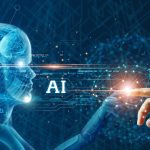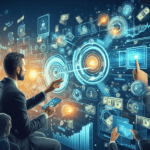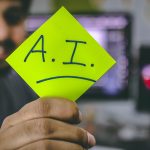Artificial Intelligence (AI) has undoubtedly transformed the way we live, work, and interact with the world. From enhancing efficiency to powering innovative solutions, AI has become an integral part of our daily lives. However, as with any powerful tool, AI comes with its own set of challenges and potential pitfalls. In this exploration, we delve into the sinister aspects of … [Read more...] about Delving into the Sinister Aspects of Artificial Intelligence
Artificial Intelligence
Learn about the latest developments in artificial intelligence and how it is transforming industries around the world. Our website offers insights and resources for understanding AI and its applications.
The Role of Generative AI in Revolutionizing FinTech Customer Experience
Generative AI, the technology underlying ChatGPT, has the potential to drastically alter many aspects of our lives and careers, including software engineering, e-commerce, and the creative industries.FinTech is not an exception when using generative AI, as automation applications are only becoming more complex.According to a recent McKinsey analysis, generative AI can generate … [Read more...] about The Role of Generative AI in Revolutionizing FinTech Customer Experience
Rebuilding Trust in the Age of AI Fabrication
The below is a summary of my article on trust in a post-truth world. The rapid evolution of AI technologies like generative models and deepfakes has enabled the seamless creation of fabricated content that challenges our ability to discern truth from fiction. This proliferation of synthetic media poses a profound threat to trust at societal and interpersonal levels. Restoring … [Read more...] about Rebuilding Trust in the Age of AI Fabrication
Navigating the AI Revolution: Key Trends and Predictions
A Brief History of AI Development Let's kick off with a whirlwind tour through AI's past. It started in the mid-20th century with basic computers and big dreams. Early AI mimicked human decision-making. In the '80s and '90s, the focus shifted to machine learning. Computers began learning from data. The 2000s brought deep learning. Neural networks started interpreting complex … [Read more...] about Navigating the AI Revolution: Key Trends and Predictions
AI Can Help Us Recycle More
Imagine a brighter, cleaner world where recycling becomes more efficient and results in less waste. Dumping less in landfills and reducing environmental impact would be astounding for humankind and planet Earth.The good news is that recycling is on the right path to reaching this goal. By introducing AI, recycling centers can simplify and speed up the process, becoming … [Read more...] about AI Can Help Us Recycle More
What is artificial intelligence (AI)?
AI refers to the development of computer systems that are able to perform tasks that normally require human intelligence, such as recognizing patterns, learning from experience, and problem-solving.
AI systems can be trained to perform these tasks through the use of algorithms and machine learning techniques, which allow them to analyze and interpret data and make decisions based on that analysis. AI has the potential to significantly improve the efficiency and accuracy of many tasks, and is being applied in a wide range of industries and applications.
How is artificial intelligence used?
AI is used in a variety of industries, including healthcare, finance, retail, and transportation, to improve efficiency and productivity.
For example, in healthcare, AI can be used to analyze medical images or electronic health records to identify patterns and make diagnoses, while in finance, it can be used to identify fraudulent activity or optimize investment strategies. In retail, AI can be used to personalize customer experiences or predict demand for products.
What are some examples of artificial intelligence?
Examples of AI include self-driving cars, language translation software, and virtual assistants like Apple’s Siri or Amazon’s Alexa.
Other examples include chatbots that can handle customer service inquiries, predictive analytics tools that can forecast future outcomes, and recommendation engines that can suggest products or content based on user preferences.
What are the potential risks and benefits of artificial intelligence?
AI has the potential to revolutionize industries and improve our daily lives, but it also raises ethical concerns and the risk of job displacement. One concern is the potential for AI systems to perpetuate or amplify biases present in the data used to train them, leading to unfair or discriminatory outcomes.
There is also the risk that AI could be used to automate tasks or make decisions that have negative consequences for humans.
On the other hand, the benefits of AI include improved efficiency and accuracy, the ability to process and analyze large amounts of data quickly, and the potential to tackle complex problems that are difficult for humans to solve.
How can I learn more about artificial intelligence?
Datafloq offers a wide range of AI articles. There are many resources available for learning about AI, including online courses, books, and industry events.
Some popular online courses include those offered by Coursera, edX, and Udacity. There are also many books on AI that provide a broad overview of the field or delve into specific topics, such as machine learning or natural language processing.
Attending industry events, such as conferences or meetups, can also be a great way to learn about AI and network with others in the field. It is important to stay up-to-date on the latest developments in the field, as AI is a rapidly evolving field with many new advances and applications emerging all the time.







